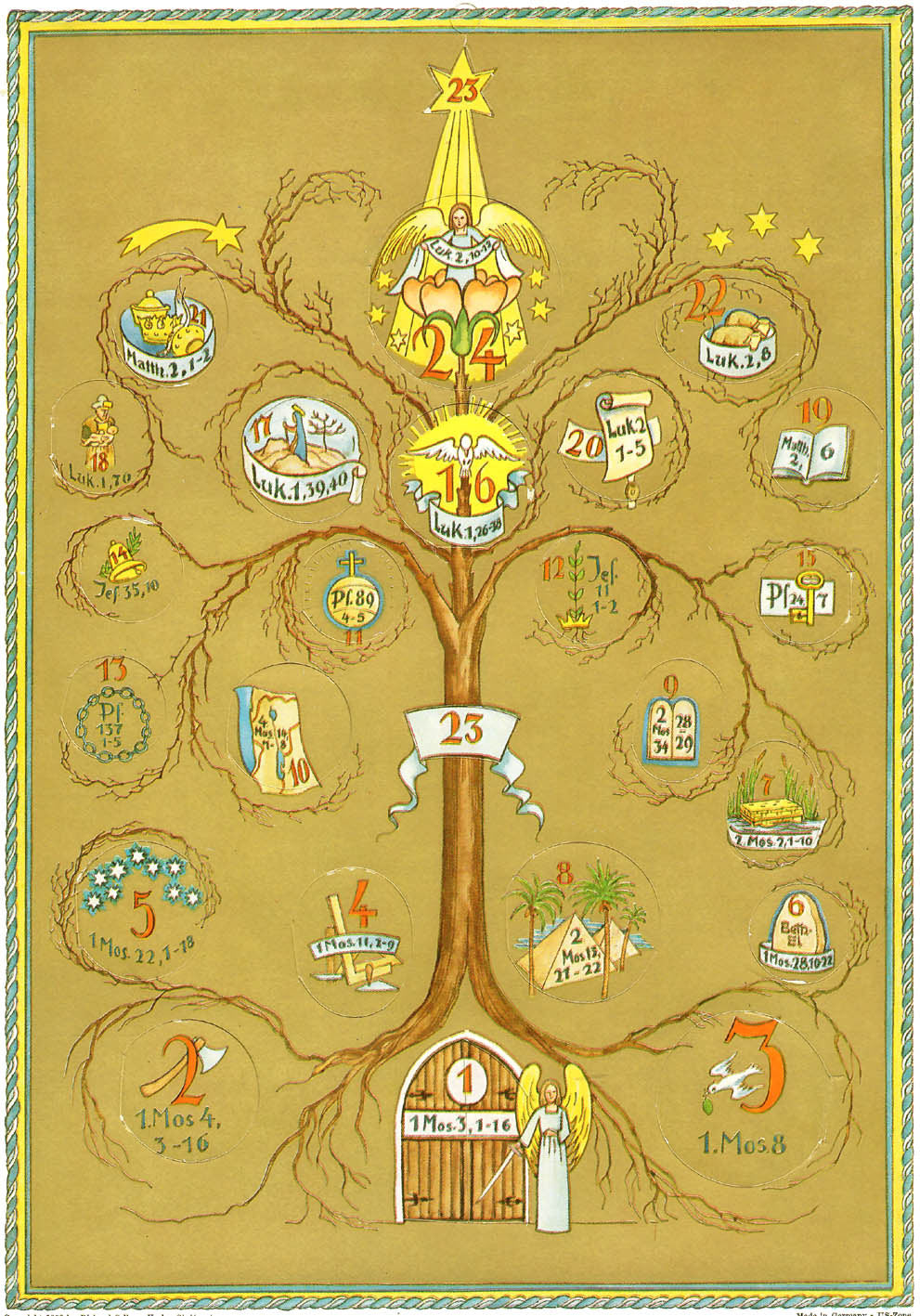 At the beginning of the 1920s, the Sankt Johannis printers in Baden Germany printed an advent calendar whose opened window showed Bible verses instead of pictures. A few thoughts on the verses every day.
At the beginning of the 1920s, the Sankt Johannis printers in Baden Germany printed an advent calendar whose opened window showed Bible verses instead of pictures. A few thoughts on the verses every day.
A messiah in swaddling clothes and a manger, Luke 2:10-18
Twenty-fourth window of the Biblical advent calendar
 The angel announced to the shepherds: “For unto you is born this day in the city of David a Saviour, who is Christ the Lord. And this will be a sign for you: you will find a baby wrapped in swaddling clothes and lying in a manger” Luke 2:11-12.
The angel announced to the shepherds: “For unto you is born this day in the city of David a Saviour, who is Christ the Lord. And this will be a sign for you: you will find a baby wrapped in swaddling clothes and lying in a manger” Luke 2:11-12.
Someone is reborn in Judaism when he converts to Judaism, comes in the religious age with the bar mitzvah, marries, is appointed as a rabbi by laying hands on him, or is installed as a king. The detail of swaddling clothes shows that the Messiah is really a baby and not a call to service.
The manger told the shepherds that the child was born in Bethlehem, in a simple house like the one they knew. The shepherds would probably have hesitated to visit a prospective king in a majestic home.
However, if they would have arrived and find a shabby stable with a frightened young mother and a distraught Joseph, they would surely have taken them to their families.
It is not clear from the biblical text where Mary and Joseph lived in Bethlehem. It’s only written (Luke 2:6): “While they were there (not arrived), the time came for her to give birth. And she gave birth to her firstborn son and wrapped him in swaddling clothes and laid him in a manger, because there was no place for them in the “room”.“
The Greek word, often translated as “inn”, occurs three times in the New Testament. We see it for the first time in the above text, the other two times it describes the room in which Jesus held the Lord’s Supper (Mark 14.14 / Luke 22.11). It is the place that is only for the people. In the parable of the Good Samaritan, Luke uses the Greek word for an inn (Luke 10:34).
According to the Bible, Mary and Joseph could have lived in a simple Jewish house. In addition, it was customary to accommodate travellers in private houses, especially if they belonged to the relatives. According to Matthew, Mary and Joseph lived in a house in Bethlehem (Matthew 2:11).
In the first century, the manger for the small animals were in simple houses in the lower rooms. Obviously, the house had been overcrowded with too many people due the census and the space in the bed-living-room was too crowded for a birth.
Jesus comes and takes part in life as it really is. And he saves people from their hopelessness and gives peace on earth to people who turn to him (Luke 2:14).
A holy fear, Luke 2:9
Twenty-third window of the Biblical Advent Calendar
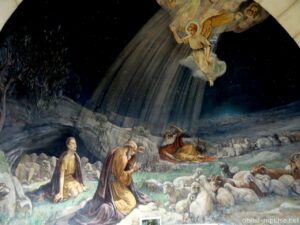 When heavenly beings meet people, they fear. Luke 2:9 says, “And an angel of the Lord appeared to them, and the glory of the Lord shone around them, and they were filled with great fear.”
When heavenly beings meet people, they fear. Luke 2:9 says, “And an angel of the Lord appeared to them, and the glory of the Lord shone around them, and they were filled with great fear.”
We see this model in all human encounters with the divine world in the Bible.
When God wanted to speak to the people at God’s mountain, the people of Israel were afraid (Exodus 20:18). Adam and Eve also were afraid and hid after ignoring God’s command (Genesis 3:10).
The divine presence blocks human beings.
In Luke 2:34 Simeon says to Mary, “Behold, this child is appointed for the fall and rising of many in Israel, and for a sign that is opposed.”
In dealing with Jesus, man reveals himself. With Jesus, man should not be afraid of the divine, but of himself.
God does not choose the angels to spread his message, but ordinary people. Therefore, Man can disagree with them and thus reveals his heart.
Either there is a holy worry about oneself and the desire to be saved. Or man reveals that he deeply does not want God.
Obay God out of fear hinders loving God. And God wants to be loved (Luke 10:27) because He is. And not because he does what human beings wants.
This is the reason why God chooses the path of unspectacular divine revelation. Man should be afraid of himself.
Environment and time, Luke 2:8
Twenty-second window of the Biblical advent calendar
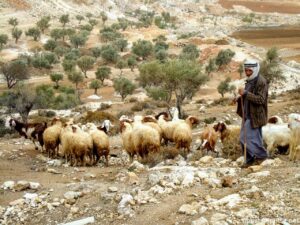
Luke 2:8 says, “In the same region there were shepherds out in the field, keeping watch over their flock by night.”
Bethlehem means house of bread. We know from the story of Ruth and Boaz that grain was also planted in Bethlehem. After the poor population had gleaned, the small animals could eat the rest.
With the reference “out in the field” we can assume that the shepherds moved around with their flocks in these fields. The traditional shepherd’s fields are also on a plateau towards the Judean desert.
 When the shepherds are in the fields with the small animals, the stables in the houses are also empty. A traditional house in Israel had four rooms. A bedroom-living room, a kitchen, a workshop and a stable for the small animals. These were accessible through an open courtyard.
When the shepherds are in the fields with the small animals, the stables in the houses are also empty. A traditional house in Israel had four rooms. A bedroom-living room, a kitchen, a workshop and a stable for the small animals. These were accessible through an open courtyard.
In Israel, the growing season begins in the fall with the rains and ends in the spring when the dry season begins.
With the solstice, Christmas is celebrated today when the days getting lighter and brighter. The darkness is over. We do not know the exact birthday of Jesus, because at that time it was not the birthday that was important, but life. Mark only begins his record with the appearance of Jesus.
John describes the coming of Jesus in a picture: “The true light, which gives light to everyone, was coming into the world“ (John 1:9). “He came to his own, and his own people did not receive him” (John 1:11). “The Word became flesh and dwelt among us, and we have seen his glory, glory as of the only Son from the Father, full of grace and truth” (John 1:14).
According to Jewish tradition, the first followers of Jesus celebrated his birthday and death on the same date.
How and when we remember the coming of Jesus into this world is less important. It is more important that we do not celebrate our feasts without him.
More than a diplomatic visit, Matthew 2:1-2
Twenty-first window of the Biblical advent calendar
 Eastern scholars came to Jerusalem because they saw in the stars that an important king must have been born in Israel. Did they know the writings of the Jews who still lived in Babylon? Numbers 24:17 says, “A star shall come out of Jacob, and a scepter shall rise out of Israel.”
Eastern scholars came to Jerusalem because they saw in the stars that an important king must have been born in Israel. Did they know the writings of the Jews who still lived in Babylon? Numbers 24:17 says, “A star shall come out of Jacob, and a scepter shall rise out of Israel.”
In the year 7 BC between May 29th and June 8th the two planets Jupiter and Saturn met in the zodiac sign Pisces. Since the biblical report says that the wise men saw the star again when they arrived, this also agrees with the calculations that this constellation also occurred in September and December of the year 7 B.C. Chr.
If the wise men from the East, from Babylonia, set out after the first meeting of Jupiter and Saturn (April 7 BC), then they could just have arrived at their destination by the second appearance.
In this context, Herod’s reaction to have all children under the age of two killed seems logical, since he heard from the wise men that the star first appeared half a year ago in spring.
It is remarkable that only the Wise Men knew about the star, but not the people in Jerusalem. This indicates that it has something to do with star constellation.
The astrologers from Babylonia linked the people of Israel to Saturn. Jupiter was considered the king planet. And the constellation of Pisces, in which the two planets met for earthly observers, symbolized today’s land of Israel.
They weren’t expecting just a local king. They wanted to worship him. That points to a heavenly king. Jesus said to Pilate in John 18:36, “My kingdom is not of this world.”
Did the wise men know about the promise of the Son of Man in Daniel 7:14? Daniel was a scholar in Babylon, and he prophesied: “To him was given dominion and glory and a kingdom, that all peoples, nations, and languages should serve him (worship); his dominion is an everlasting dominion, which shall not pass away, and his kingdom one that shall not be destroyed.”
Life gets out of hand, Luke 2:1-5
Twentieth window in the Biblical advent calendar
 The emperor ordered that all the world should be registered. Therefore, Joseph and Mary went from Nazareth to Bethlehem to their hometown (Luke 2:1-5).
The emperor ordered that all the world should be registered. Therefore, Joseph and Mary went from Nazareth to Bethlehem to their hometown (Luke 2:1-5).
That they had to travel to Bethlehem gives us an indication that they had family property in Bethlehem. You had to be registered where your property was.
According to the law, the Jews were not allowed to sell their family property (except for a town house), but it was possible to lease it for a period of time (Leviticus 25:23-28).
Because Mary had to travel with them, it indicates that she was an heiress of the family property (Numbers 27:8). Otherwise, Josef could have made the trip without his heavily pregnant wife.
Mary’s name means sorrow. Was she given this name because her parents were expecting a son? Or did the mother die during childbirth and shortly afterwards her father too? Was she with relatives in Nazareth? We do not know. Another reference to her name arose when Simeon announced in the temple her suffering for her new-born son Jesus: “A sword will pierce through your own soul“ (Luke 2:35).
The name Joseph means “he [God] adds“. The husband of an inherited daughter had to be registered in the family of her father and got two “fathers”. Because the line of a family should continue (Deuteronomy 25.5-10 / Nehemiah 7.63). Matthew’s genealogical tree would then describe the natural line from Joseph and Luke’s line through marriage the biological family of Mary, also descended from King David. Joseph was “added” to Mary’s family.
If the story of Jesus’ birth had been invented, there would not be so many unanswered questions and inexplicable connections.
Obstacles are often placed in the way of those who walk with God. David writes in Psalm 18:29: “By my God I can leap over a wall”.
The King from Bethlehem, Matthew 2:6
Nineteenth window of the Biblical advent calendar
 The scholars from the east ask Herod where the new king of the Jews was born. King Herod asks the scribes, and they answer with Micah 5:2. A ruler will come out from Bethlehem. Matthew 2:6 adds that he is the shepherd. Micah 5:2 says, “whose coming forth is from of old, from ancient days”.
The scholars from the east ask Herod where the new king of the Jews was born. King Herod asks the scribes, and they answer with Micah 5:2. A ruler will come out from Bethlehem. Matthew 2:6 adds that he is the shepherd. Micah 5:2 says, “whose coming forth is from of old, from ancient days”.
It was clear to the scribes that the divine shepherd originated before our time. And their interpretation is: He is the promised shepherd.
Jesus says in John 10:11, “I am the good shepherd. The good shepherd lays down his life for the sheep.” He is referring to Ezekiel 34:12, where God describes himself as the saving Shepherd.
In John 8:58 Jesus says, “Before Abraham was, I am.”
Both times the listeners want to stone Jesus. Although it was clear to the scribes based on Micah 5:1, even before Jesus taught, that the expected prince is also the divine shepherd, who has his origin before his birth. A mystery that cannot be explained humanely. But what God says becomes reality.
John prepared the way of the divine light, Luke 1:76
Eighteenth window in the Biblical advent calendar
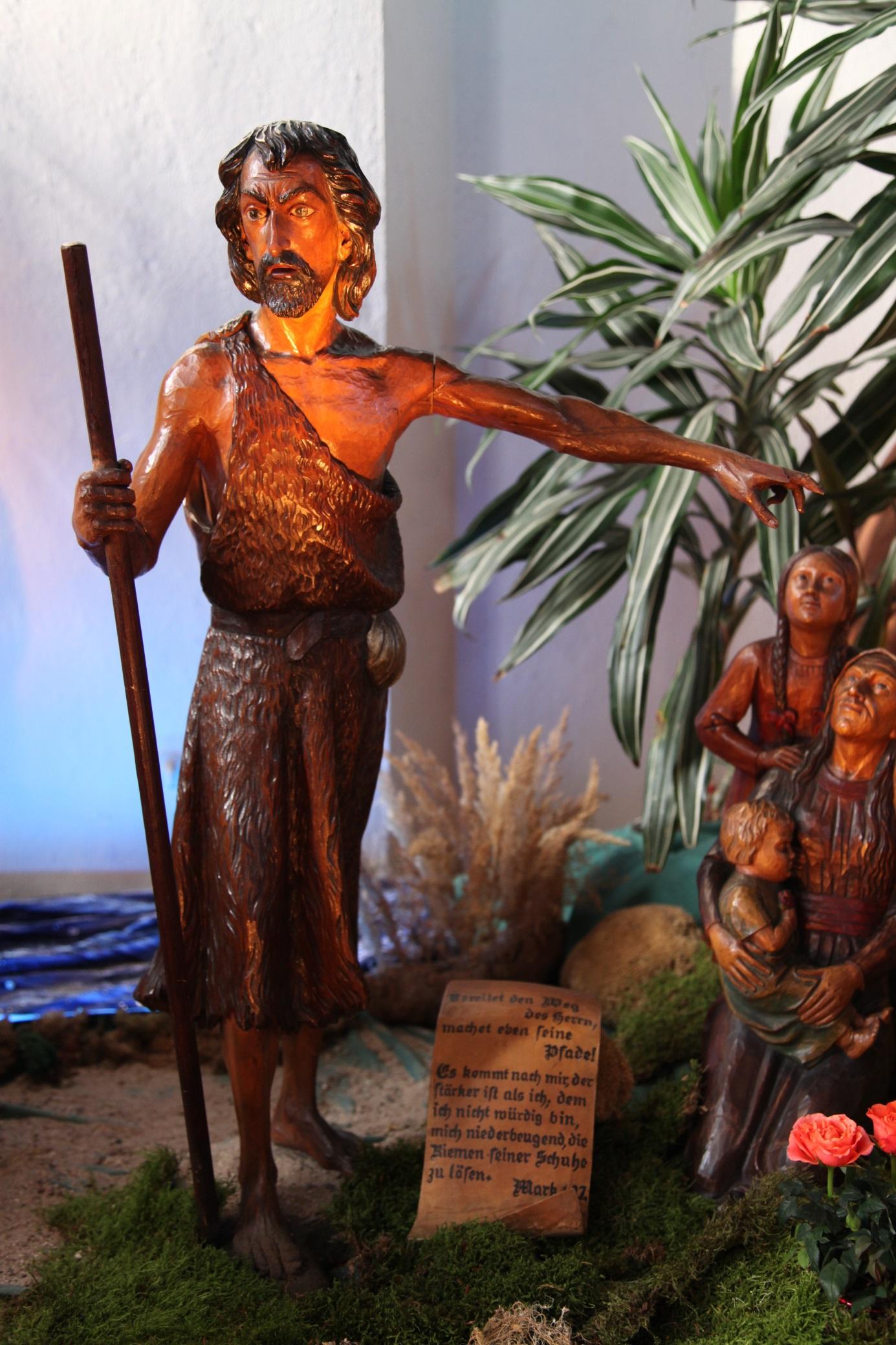 Mary stayed with Elizabeth for three months until John was born (Luke 1:56). She also experienced the third song of jubilation, the praise of Zechariah (Luke 1:68-79). When Zechariah regained his voice at the circumcision and naming of John, he describes the destiny of the two children.
Mary stayed with Elizabeth for three months until John was born (Luke 1:56). She also experienced the third song of jubilation, the praise of Zechariah (Luke 1:68-79). When Zechariah regained his voice at the circumcision and naming of John, he describes the destiny of the two children.
John will prepare the way (Luke 1:76) for the divine light, which visits his people in the dark to guide their feet into the way of peace.
Filled with the Holy Spirit, Zechariah encourages those around him. He points out that God visits us (Luke 1:68). In Jesus the Saviour we see how God is.
The experience of forgiveness and the knowledge of salvation changes our lives (Luke 1:77). We receive a new identity as children of God.
Jesus says in John 8:12, “I am the light of the world. Whoever follows me will not walk in darkness, but will have the light of life.”
What a wonderful picture. The divine light visits us to show us the way out of darkness and to guide us on the path of peace.
John points to this light. John 3:28: “I am not the Christ, but I have been sent before him.” “As it is written in the book of the words of Isaiah the prophet, ‘The voice of one crying in the wilderness: Prepare the way of the Lord, make his paths straight’” (Luke 3:4).
His call to open the way for the divine light and not to oppose it is still valid today.
Time out and encouragement, Luke 1:39-40
Seventeenth window in the Biblical advent calendar
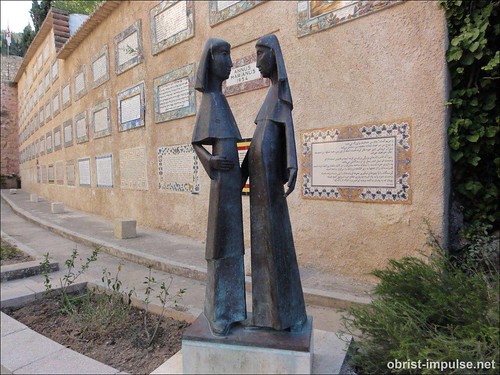 Mary goes to her relative Elizabeth (Luke 1:39-40). Two women meet who, in their deep faith in God, have personally experienced that God’s power has been shown in their lives. Both are expecting a child, although it would not have been possible according to their circumstances.
Mary goes to her relative Elizabeth (Luke 1:39-40). Two women meet who, in their deep faith in God, have personally experienced that God’s power has been shown in their lives. Both are expecting a child, although it would not have been possible according to their circumstances.
Maria needs a protected basis in which she can be understood. The pressure in her environment would be too great. She needs strength on her way. God does not leave Mary alone, but also provides of her care.
Maria can’t just retreat somewhere. Therefore, her old relative who is getting a child is a good reason to support her. Her house is a safe place.
The surprising thing is that Elisabeth first speaks about Maria and her situation. Her foetus jumps with joy, as Mary arrives. Even before birth, a child recognizes its environment and reacts with emotions.
Elisabeth’s encouragement confirms Maria on her way. Elizabeth says, “Blessed are you among women, and blessed is the fruit of your womb! 43 And why is this granted to me that the mother of my Lord should come to me? 44 For behold, when the sound of your greeting came to my ears, the baby in my womb leaped for joy. 45 And blessed is she who believed that there would be a fulfilment of what was spoken to her from the Lord.” (Luke 1:42-45). These are prophetic words given by the Holy Spirit.
This worship of Elisabeth is a sign to Mary that the angel’s words are becoming reality.
Trust in God through knowledge of history, Luke 1:26-38
Sixteenth window in the Biblical advent calendar
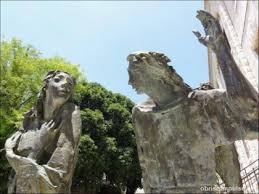 Biblical belief trusts that nothing is impossible for God (Luke 1:37). This faith comes from knowing how God has acted in the past and is expressed in surrender trusting to God.
Biblical belief trusts that nothing is impossible for God (Luke 1:37). This faith comes from knowing how God has acted in the past and is expressed in surrender trusting to God.
When the angel announced to Mary that she would have a child as a virgin, the angel assumed biblical knowledge. Maria is not a naive young woman; she knows the meaning of each word.
The Bible is not a collection of independent stories of miracles, but a connection of them.
When Sarah, Abraham’s wife, gave birth to a child at the age of 90, God said, like the angel to Mary here: “Is there anything impossible for the LORD?” (Genesis 18:14 / literally: Not a word that comes from God will be powerless). Maria knew about Elisabeth that she too was expecting a child at her advanced age. If God works such miracles, then she too can become the mother of an extraordinary child. A child who will become both, the son of the Most High and a descendant of David (Luke 1:32). His name means Saviour (Luke 1:31) and he belongs to God (holy / Luke 1:35). He will reign forever (Luke 1:33). Therefore, death has no power over him.
Even if all this cannot be understood with human logic, Mary trusts God: “Let it be to me according to your word” (Luke 1:38). Faith lives on the miracle of trust.
King of Glory, Psalm 24:7
Fifteenth window in the biblical advent calendar
P salm 24:7 says, “Lift up your heads, O gates! And be lifted up, O ancient doors, that the King of glory may come in”.
salm 24:7 says, “Lift up your heads, O gates! And be lifted up, O ancient doors, that the King of glory may come in”.
In Luke 20:41-44, Jesus asks his listeners, “How can they say that the Christ (Messiah) is David’s son? For David himself says in the Book of Psalms (110:1): “‘The Lord said to my Lord, “Sit at my right hand, until I make your enemies your footstool.”’ David thus calls him (the Messiah) Lord, so how is he his son?”
With this, Jesus draws attention to the fact that he already existed as the Messiah and was born as a child (son of David) coming from the right hand of God. His authority comes from heaven and not from human wisdom. He is the King of glory, to whom all things are laid at his feet.
The book of Ezekiel describes how the presence of God (Shechina) left the temple and was last on the Mount of Olives (Ezekiel 11:23). From there it will come back from the east according to Ezekiel 43:4.
Jesus entered Jerusalem from the Mount of Olives and in Matthew 21:9 it says: “The crowds that went before him and that followed him were shouting, “Hosanna to the Son of David! Blessed is he who comes in the name of the Lord! Hosanna in the highest!”
Eternal joy and rejoicing, Isaiah 35:10
Fourteenth window in the biblical advent calendar
 Isaiah 35:4 says, “Behold, your God will come … He will come and save you.” And in verse 10: “And the ransomed of the Lord shall return and come to Zion with singing; everlasting joy shall be upon their heads; they shall obtain gladness and joy, and sorrow and sighing shall flee away.”
Isaiah 35:4 says, “Behold, your God will come … He will come and save you.” And in verse 10: “And the ransomed of the Lord shall return and come to Zion with singing; everlasting joy shall be upon their heads; they shall obtain gladness and joy, and sorrow and sighing shall flee away.”
Some say, “I want to be free,” so they don’t want to believe in God. The Bible confess it is the other way around. Whoever believes is free. The liberated cheer and rejoice.
The so-called freedom without belief is not so free at all. You earn what you sow. In the end, all that remains is waiting for the death, where you lose everything.
The believer, on the other hand, longs for God, who frees him from the limitations of this world and gives him an eternal perspective. He is waiting for God who saved him.
Revelation 7:17 says, “For the Lamb in the midst of the throne will be their shepherd, and he will guide them to springs of living water, and God will wipe away every tear from their eyes.”
Our purpose is to be children of God. Where we talk to one another, value one another, serve one another and bring joy to one another. Jesus is the Lamb that leads us into the presence of God.
Longing for salvation, Psalm 137:1-5
Thirteenth window in the biblical advent calendar
 The Jews in the exile of Babylon could not really rejoice because Jerusalem was still destroyed, Psalm 137:1-5 tells us. The longing for salvation was so strong that part of the Jews returned under Nehemiah and Ezra. Restoration began and the way prepared for God’s prophecies to be fulfilled in Jesus.
The Jews in the exile of Babylon could not really rejoice because Jerusalem was still destroyed, Psalm 137:1-5 tells us. The longing for salvation was so strong that part of the Jews returned under Nehemiah and Ezra. Restoration began and the way prepared for God’s prophecies to be fulfilled in Jesus.
Jesus spoke about the fact that he will come again (Matthew 16,27 / Matthew 24,30). The restoration of Israel prepares the way for Jesus to fulfil the second part of the promises. How it exactly will be fulfilled will probably surprise us as much as it surprised the disciples of Jesus.
The two disciples on the road to Emmaus did not understand why everything had to happen the way it did. Jesus interpreted to them in all the Scriptures the things concerning himself (Luke 24:27). We too are dependent on the Holy Spirit guide us into all the truth (John 16:13).
Romans 8:19 says, “The creation waits with eager longing for the revealing of the sons of God.”
Advent means waiting joyfully for Jesus, but not letting end-time expectations block us. Jesus says in Luke 21:28, “Now when these things (the powers of the heavens will be shaken) begin to take place, straighten up and raise your heads, because your redemption is drawing near.”
Some will meet Jesus sooner than they expected. That’s why Jesus says we should be always ready (Matthew 24:44).
God fulfils his predictions unexpectedly
Twelfth Window in the Biblical Advent Calendar
 In Isaiah 11:1-2 it is promised: “There shall come forth a shoot from the stump of Jesse, and a branch from his roots shall bear fruit. And the Spirit of the Lord shall rest upon him”.
In Isaiah 11:1-2 it is promised: “There shall come forth a shoot from the stump of Jesse, and a branch from his roots shall bear fruit. And the Spirit of the Lord shall rest upon him”.
This descendant will lead to the kingdom of peace, of which it is written: “They shall not hurt or destroy in all my holy mountain; for the earth shall be full of the knowledge of the Lord” (Isaiah 11:9).
Jesse was the father of David (Ruth 4:17). Matthew 2:23 says Joseph and his family “lived in a city called Nazareth, so that what was spoken by the prophets might be fulfilled, that he would be called a Nazarene“. The city’s name is a reference to Isaiah 11:1, which speaks of a root shoot (Hebrew: nezer). The craft worker of Bethlehem established their own settlements and gave them “Messianic” names such as “Village of the star” or “Village of roots shoot” (Nazara). There was enough work in the city of Sepphoris, which Herod Antipas had rebuilt. It was two hours’ walk north of Nazareth.
When Jesus was born, the angels proclaimed to the shepherds, “On earth peace among those with whom he is pleased” (Luke 2:14).
Isaiah 9:6 says, “For to us a child is born, to us a son is given; and the government shall be upon[4] his shoulder, and his name shall be called[5] Wonderful Counsellor, Mighty God, Everlasting Father, Prince of Peace.”
The kingdom of Jesus is a kingdom of peace. That is why Jesus instructs his disciples to first wish “Peace be to this house” (Luke 10:5).
His kingdom arises not observed (Luke 17:21). It’s reveals where people accept God’s offer of peace.
Pilate summed up Isaiah 11:1 by writing on the cross: “Jesus of Nazareth, the King of the Jews” (John 19:19).
When the risen Jesus met his disciples, he said, “Peace to you” (Luke 24:36).
God fulfils his promises in a different way than we imagine. For him there is no hopeless situation from which he cannot create something new. He leads to his kingdom of peace.
Royal dignity comes from inside
Eleventh window in the biblical advent calendar, Psalm 89:3-4
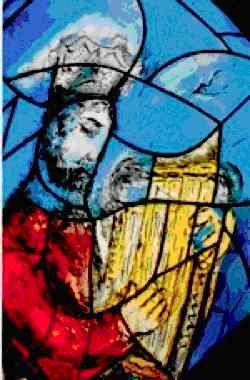 God promises King David, “I will establish your offspring forever, and build your throne for all generations“ (Psalm 89:3-4).
God promises King David, “I will establish your offspring forever, and build your throne for all generations“ (Psalm 89:3-4).
What does David have to do with Christmas?
Jesus is called “son of David” (Matthew 21:9). All of Jesus’ opposition did not contradict this, although it would have been easy for them if Jesus were not among David’s descendants. The registers were still present in the temple. No one questioned the lineage of Jesus at that time.
In Matthew 1:20 the angel said, “Joseph, son of David, do not fear to take Mary as your wife, for that which is conceived in her is from the Holy Spirit.”
The wise men from the east then asked, “Where is he who has been born king of the Jews?” (Matthew 2:2). On the cross hung the sign: “This is Jesus, the King of the Jews“ (Matthew 27:37). He himself said: “All authority in heaven and on earth has been given to me“ (Matthew 28:18).
But his birth stands in a big difference to his royal title. He lay poor in a feeding trough. No pomp, no glamour. The gifts of the wise men were just enough to finance the escape from King Herod to Egypt.
Jesus wore no crown, drew no sword, led not an army, and used no power system. His dignity came from within. His mere appearance, his mere word, has produced a revolution in the world that all revolutions in world history pale in comparison to. In Jesus, the king’s promise to David continues for all eternity.
It is not the powerful rulers who bring long-term change, but those who show themselves weak. A particular strength lies in vulnerability. Those who can show themselves vulnerable are actually strong.
The believer counts on God, Numbers 14:7-8
Tenth window in the biblical advent calendar
 When the twelve spies told the people of Israel about the promised land, ten said it is impossible to take the land. Joshua and Caleb, on the other hand, did not look at the problems, but at the good and that God is with them (Numbers 14:7-8).
When the twelve spies told the people of Israel about the promised land, ten said it is impossible to take the land. Joshua and Caleb, on the other hand, did not look at the problems, but at the good and that God is with them (Numbers 14:7-8).
It is amazing. Day after day the Israelites see the miracle of the pillar of cloud and the bread of heaven, manna. They had also witnessed the fall of the great army of the Egyptian world power, which had previously defeated the country’s inhabitants. And now they only see problems.
How quickly we lose sight of God’s possibilities in hopeless situations.
David Ben-Gurion, the first Prime Minister of Israel, said: “He who does not believe in miracles is not a realist“.
Biblical faith is based on miracles. Miracles are actions that cannot be classified with our logic.
In Deuteronomy 18:18 a prophet like Moses is promised. The characteristics of Moses were the direct line to God and miracles (Deuteronomy 34:10-12).
Jesus is not only an excellent teacher. He is one with God and performs the miracles of Moses. His birth, his life, his resurrection – all miracles. There are some things we cannot explain, but then the path of trust begins.
C.S. Lewis said “miracles prove historicity” Normally we would say it the opposite. It’s a beautiful story, but it can’t be historical.
But let’s take the example of the resurrection of Jesus. The disciples gave their lives for this story. All but John died as martyrs. You don’t do that for a fictional story. The miracle was not their deliverance but their trust in God and His resurrection.
Miracles do not automatically lead to belief. We see this in the situation of the Israelites and the sick man from the pool of Bethesda. Instead of following Jesus, he betrayed him to the controller (John 5:1-16).
A fellow student reported to me that his daughter-in-law, who had already been described as a hopeless situation, and her child were completely restored through spontaneous healing – as the doctors called it. For my fellow student and his family, it was not an inexplicable “spontaneous healing” but clearly a miracle of God. They celebrated thanks and commemoration for God’s intervention. A year ago, he was supposed to tell his son that his wife and child would not survive the accident.
Others do not experience a physical miracle but discover the limit of understanding and the miracle of trust.
In looking to God, we change, Exodus 34:28-29
Ninth window in the biblical advent calendar
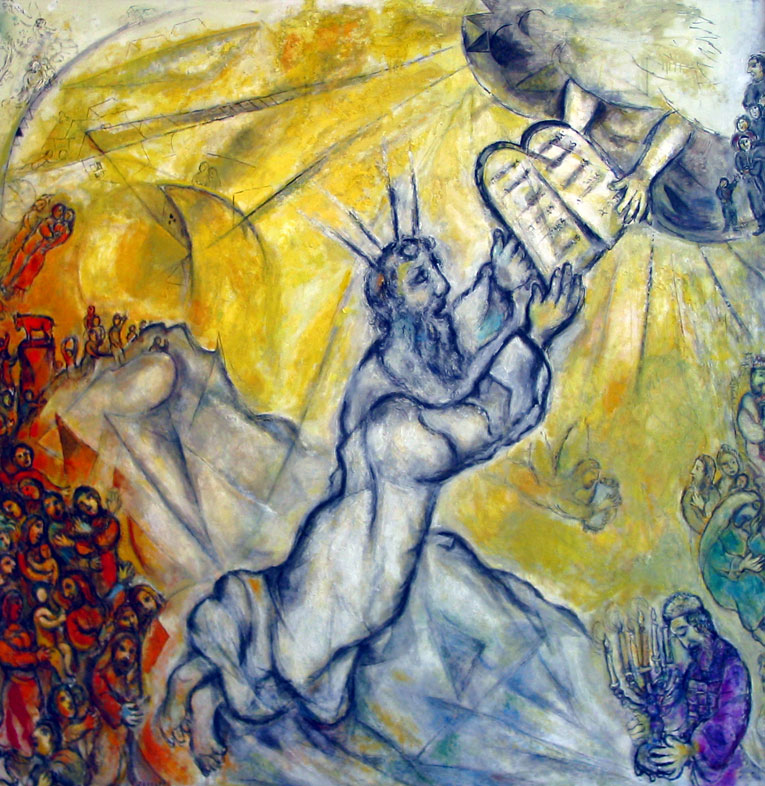 Exodus 34:29 says of Moses: “The skin of his face shone because he had been talking with God.”
Exodus 34:29 says of Moses: “The skin of his face shone because he had been talking with God.”
Paul writes in 2 Corinthians 3:18, “We all, with unveiled face, beholding the glory of the Lord, are being transformed into the same image from one degree of glory to another.”
In front of God, much that was important to us becomes secondary. Some think that once they stand before God, they will question him, why he didn’t act as they expected. I think when we will meet God, we’re going to ask ourselves why we didn’t get involved with him more.
When we read the Bible in prayer and allow ourselves to be inspired by God, suddenly a new perspective opens up for us.
John 1:14 says, “The Word became flesh and dwelt among us, and we have seen his glory, glory as of the only Son from the Father, full of grace and truth.”
Moses brought the Torah with him from his encounter with God. God’s love and undeserved grace are revealed in Jesus.
Jesus said to Nicodemus: In looking to the lifted up Son of man is the secret of faith (John 3:14).
There is a story about a little boy who read about Moses. His name is Xaverl.
“Oh,” says Xaverl, “It can be seen, when someone talks to you a lot and is your friend.” He’s almost shocked. What if his face starts to shine too? Will everyone fear to come near him?
Xaverl goes into the bathroom and looks in the mirror. His face is as always, quite brown from the sun and wind, with a few dark freckles on his nose and cheeks. Nothing lights up, nothing at all.
Xaverl is almost disappointed. A small, very small glow would not have bothered him. Xaverl catches his breath. First the shock, then the disappointment. No wonder he’s hungry now, he feels empty and weak inside. He goes into the kitchen. He hears voices from the garden. He pushes the window open a crack. The mother is talking to the old baker, who is looking over the fence at the herb bed.
“Yes, yes,” says the mother. “It’s practical, the herb bed. The boy gave it to me for Mother’s Day, and weeks beforehand he had been working on it and sowing and watering it, and I was never allowed to look.”
“You can be satisfied with your Xaverl,” says the baker. “Such a dear child. And so happy. There’s something shining about him.” (From: Wenn du meinst lieber Gott / Verlag St.Gabriel / S.57-58)
It shows when we meet God.
The cloud-fire-pillar – a sign of God’s presence, Exodus 13:21-22
Eighth window in the biblical advent calendar
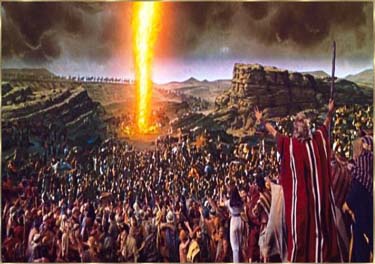 A pillar of cloud, which turned into a pillar of fire at night, guided the people of Israel out of slavery on their journeys trough the desert and determined times of departure and camp (Exodus 40:36-37). As a visible sign of God’s presence, it is also mentioned later, long after the desert experience (1 Kings 8:11). Already in front of Abraham God appears in a pillar of fire (Genesis 15:17).
A pillar of cloud, which turned into a pillar of fire at night, guided the people of Israel out of slavery on their journeys trough the desert and determined times of departure and camp (Exodus 40:36-37). As a visible sign of God’s presence, it is also mentioned later, long after the desert experience (1 Kings 8:11). Already in front of Abraham God appears in a pillar of fire (Genesis 15:17).
The pillar puts itself between the Israelites and their enemies and protects them (Exodus 14:19). It changes depending on the environment like day and night. It is clearly visible. It is neither a mist nor an undefinable light. But the pillar has no explanation. It just stands there in space and time. It is a sign from another dimension. It is a constant miracle in front of the eyes of the Israelites.
David writes at Psalm 27:1: “The LORD is my light and my salvation”.
At Isaiah 49:6 it is written about the Messiah: “I will make you as a light for the nations, that my salvation may reach to the end of the earth.”
In Jesus God encounter with us and leads us out of the slavery of sin. Jesus existed before he was born (John 8:58). He was a real person and yet he was from another world, as he himself testified to Pilate (John 18:36). In this world but not of this world (John 8:23).
Philip says to Jesus in John 14:8, “Lord, show us the Father.” And Jesus answered, “Whoever has seen me has seen the Father.” In John 10:30 Jesus said, “I and the Father are one.”
God cannot be contained in our thinking box. A God who is only allowed to be what I can imagine would be untrustworthy.
Some see Jesus and do not understand that they are looking at a miracle from God.
God’s ways are different than our solutions, Exodus 2:1-10
Seventh window in the biblical advent calendar
 The Israelites are in Egypt persecuted. Not because they rebel, but because they are doing well and are blessed by God. They outnumbered the Egyptians. In his delusion, the pharaoh made the murder of children a state program. And no one opposes (Exodus 1:22).
The Israelites are in Egypt persecuted. Not because they rebel, but because they are doing well and are blessed by God. They outnumbered the Egyptians. In his delusion, the pharaoh made the murder of children a state program. And no one opposes (Exodus 1:22).
What would we have done in God’s place? Probably the pain removed.
But God takes the pain and turns it into the solution. Moses’ name means “drew out of the water.” Pharaoh has thrown the boys into the water and God drew a Saviour from there. The great paradox is that Pharaoh’s daughter becomes the key person in the story of salvation (Exodus 2:1-10).
The whole story is a preview of the birth of Jesus. Herod killed the children of Bethlehem. But God has already, through the gifts of the wise men from the east, ensured that Jesus, Mary and Joseph could flee to Egypt and that the “Prophet like Moses” (Deuteronomy 18:18-19) called from the Nile country (Matthew 2:15).
Moses and Jesus are both Saviours and both needed to be saved as children.
For both mothers, there are not “their sons”. Moses was grown up in the royal family, and Jesus is the Son of God.
Jesus conquers evil by enduring it.
The ladder to heaven, Genesis 28:10-22
Sixth window in the biblical advent calendar
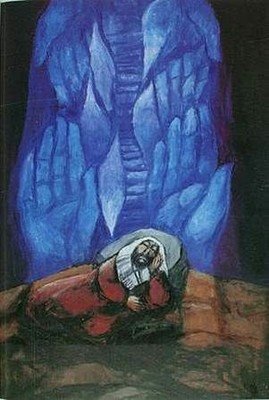 Jacob fights for his rights and has lost everything. Then he encounters God. He sees a ladder to heaven and God promises to take care to him.
Jacob fights for his rights and has lost everything. Then he encounters God. He sees a ladder to heaven and God promises to take care to him.
Jacob must have learned from his mother which promises were given to his life. But in reality, everything seems to be the other way around. With all his wisdom he tried to implement God’s will. Now he has lost everything. Why doesn’t God intervene?
On his escape, he encounters God in a dream. He sees a ladder that reaches up to heaven. Angels of God ascend and descend. God said to him, “I am the LORD, the God of Abraham your father and the God of Isaac. … in you and your offspring shall all the families of the earth be blessed. Behold, I am with you and will keep you wherever you go …. For I will not leave you until I have done what I have promised you.” (Genesis 28:12-15) When Jacob wakes up, he says: God resides here and here is the gate to heaven!
It is exciting that Jesus also speaks of a ladder to heaven in the New Testament: “You will see heaven opened, and the angels of God ascending and descending on the Son of Man” (John 1:51).
With his reference to the ladder to heaven, Jesus says that God comes down to mankind through him and fulfil the promise to Jakob. Jesus says in Matthew 7:13: “Enter by the narrow gate“. The cross becomes like a ladder to heaven that we can hold on to.
Instead of man getting in control on God, God meets people who have stopped trusting in themselves. Man finds strength in God who acknowledges that he himself is in need for God’s help.
Blessings to all through Abraham’s seed, Genesis 22:1-18
Fifth window in the biblical advent calendar
 A strange story is written in Genesis 22. Abraham goes with his son Isaac to the Mount Moriah to sacrifice him according to God’s command. At the last moment, God interrupts and provides Abraham with a sacrificial animal.
A strange story is written in Genesis 22. Abraham goes with his son Isaac to the Mount Moriah to sacrifice him according to God’s command. At the last moment, God interrupts and provides Abraham with a sacrificial animal.
How can God order something like this? He himself said: “Whoever sheds the blood of man, by man shall his blood be shed, for God made man in his own image” (Genesis 9:6).
In Jewish tradition, this event is so shocking that Sarah dies by hearing of it. All their lives Abraham and she waited for this son. All their hope lay on him. And now Abraham is ready to destroy all of it? Since Sarah died at 127 and gave birth to her son Isaac at 90 (Genesis 23:1 / 17:17), it is believed that Isaac was 37 years old when all this took place.
The apocryphal book of Maccabees says: “Who was the father by whose hand Isaac wanted to be slaughtered for the sake of piety?” (4 Maccabees 13:12). Here is reported that Isaac offers himself as a sacrifice.
Genesis 22 says that Abraham was sure that he and his son would return: “Stay here with the donkey” Abraham said to the servant. “I and the young man will go over there and worship and come again to you” (Genesis 22:5). In Hebrews it says: “He considered that God was able even to raise him from the dead, from which, figuratively speaking, he did receive him back” (Hebrews 11:19). Here is a key to the story.
Abraham has seen many miracles from God. At the age of 100 he and his ninety-year-old wife Sarah receive the long-promised child. He counts so firmly on a miracle that he says to his son, “God will provide for himself the lamb for a burnt offering, my son.” (Genesis 22:8). John uses this expression to point his disciples to Jesus: “Behold the Lamb of God” (John 1:29 / 1:36).
When God interrupted Abraham with the sacrifice through the angel of the Lord, he gave him and his son a ram that was caught in the bushes. Isaac witnesses, someone else dying at his place.
Jesus also proclaims the same message to us on the cross: He died in our place to set us free from the consequences of sin. John said, “Behold, the Lamb of God, who takes away the sin of the world!” (John 1:29). The ram that Abraham sacrificed is not the actual Lamb of God, but only a forecast of it. Every sacrifice, which was an integral part of religious life among the Jews, was a silent reference to the real Lamb of God.
The Lamb of God fulfils what God promised Abraham in Genesis 22:18: “In your offspring shall all the nations of the earth be blessed, because you have obeyed my voice.” God writes his redemption story with the Jewish people.
Mount Moriah is identified with today’s Temple Mount (2 Chronicles 3:1). The cross of Jesus (Golgotha) also stood on its foothills. It was in this place, then, that God revealed and accomplished His plan of salvation.
Fourth window in the biblical advent calendar
After the reset, the diversification, Genesis 11:2-9
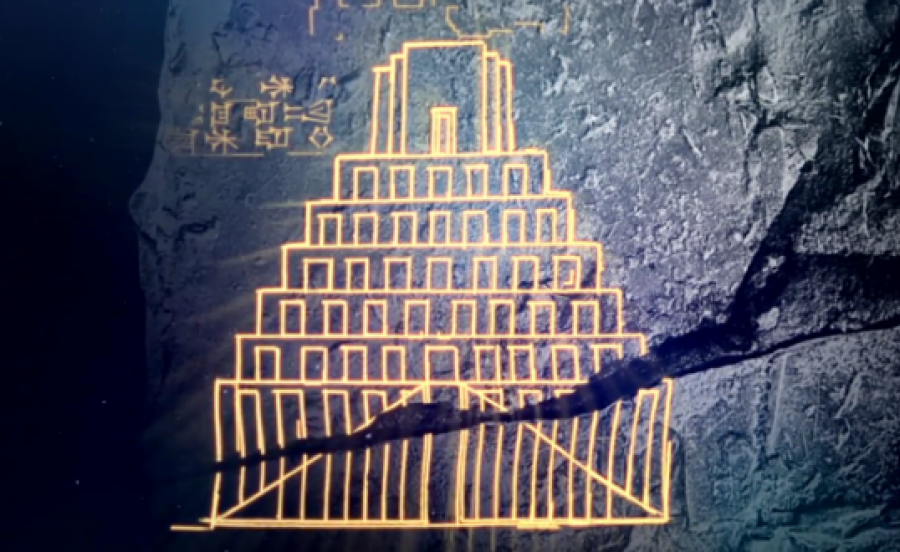 In order that everything doesn’t go down, diversification comes after the reset.
In order that everything doesn’t go down, diversification comes after the reset.
The people of Babel didn’t want to go along with God’s instructions “fill the earth” (Genesis 1:28 / Genesis 9:1). They built a tower “lest we be dispersed over the face of the whole earth” (Genesis 11:4). Man wants to live independently of God. “Nothing that they propose to do will now be impossible for them“ (Genesis 11:6). The Jewish historian Flavius Josephus (37 to 100 AD) explains that out of mistrust of God’s promise not to allow any more floods, people “build a tower so high that the floods of water cannot climb it«.
Babel symbolizes a humanity that rebels against God’s orders and takes everything into its own hands and wants to decide by themselves. By building a stairway to heaven, they wanted to put themselves on the same level as God. They lived in hubris and conceit.
Nimrod, the founder of Babylon, was a hunter (Genesis 10:9-10). A hunter takes what he has not raised or produced himself. Genesis 10:8 says he was the first violent one.
The image of God’s kingdom, on the other hand, is the good shepherd who calls his flock and protects it from thieves (Ezekiel 34:12).
God came down to Babylon to see what man was up to do (Genesis 11:4-5). He divides people into languages to disrupt the negative power system. From now on he is looking for people who are willing to walk with him. Jesus calls us as the good shepherd to follow him to become learners (disciples).
Third window: Genesis 8, God wants to win our hearts
God started the great reset with the flood. Noah was the man of trust. God promised peace to him through the dove with the olive branch. As soon as Noah was back on solid ground, he gave thanks to God for salvation with a burnt offering.
This prompted God to promise that he would never again intervene so extensively because of mankind. God knows: Mankind has remained mankind. His heart is evil from youth (Genesis 8:21).
A reset and a new environment are not enough. Man must change his heart. Instead of turning away from God, man must turn to God by free will – turn around (Jeremiah 2:27). In order to turn to God, God must reveal his love to human beings.
In Jesus, God’s love becomes visible and touchable (John 3:16). The cross is the ark of God – the place of salvation. Our thanks for Jesus’ deputy death and resurrection are the keys to staying in touch with God and being transformed by Him.
Second window: Genesis 4:3-16, Abel’s prophetic sacrifice
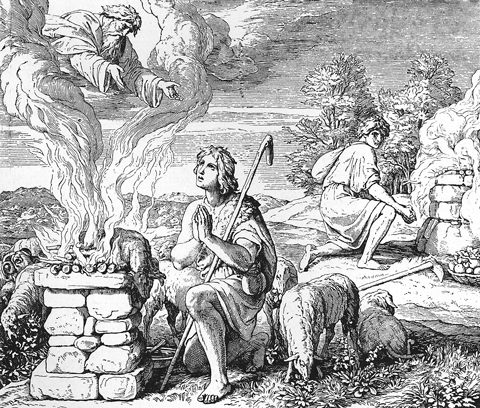 Jesus called Abel a prophet (Luke 11:51). We don’t hear a word out of his mouth. But he is a good observer. His parents were clothed in a skin by God (Genesis 3:21). The death of an innocent animal, the very first death in the Bible, made it frighteningly clear what a disaster, what a terrible reality sin – rebellion against God’s order of creation – is. Isaiah later writes: “I will greatly rejoice in the Lord; … for he has clothed me with the garments of salvation; he has covered me with the robe of righteousness” (Isaiah 61:10). Adam realized a sacrifice worthy to God is a firstborn of his flock.
Jesus called Abel a prophet (Luke 11:51). We don’t hear a word out of his mouth. But he is a good observer. His parents were clothed in a skin by God (Genesis 3:21). The death of an innocent animal, the very first death in the Bible, made it frighteningly clear what a disaster, what a terrible reality sin – rebellion against God’s order of creation – is. Isaiah later writes: “I will greatly rejoice in the Lord; … for he has clothed me with the garments of salvation; he has covered me with the robe of righteousness” (Isaiah 61:10). Adam realized a sacrifice worthy to God is a firstborn of his flock.
Cain wants to serve God the way he wants. He is not willing to be corrected. God speaks to him, but he looks for the fault in the others. He takes out his anger towards God on his brother. So Abel became the first man to die for his faith.
God said something strange to Cain: “The voice of your brother’s blood is crying to me from the ground” (Genesis 4:10). The blood of Abel cries: Revenge! Retribution! Yet the shed blood of Jesus offers forgiveness and grace. The blood of Jesus overcomes the blood of revenge because it was given freely and out of love. Jesus said, “No one takes it from me, but I lay it down of my own accord” (John 10:18).
Abel prophesied that we need atonement. Hebrews 12:24 says, “Jesus, the mediator of a new covenant, and to the sprinkled blood that speaks a better word than the blood of Abel.”
Jesus was born so that, through Jesus’ substitutionary death, we could acknowledge the consequences of a life turned away from God and gratefully claim divine forgiveness.
First window: Genesis 3:1-16
The Bible tells us that God created human beings. They lived in a garden where there was a “Tree of Life” and the untouchable “Tree of Death”. Someone is now twisting the words of God and mankind is going along with it. According to Christian understanding, behind the serpent is the devil, or confuser (Revelation 12:9). Central from a Christian point of view is that people want to decide for themselves what is good for them. They began to distrust God that he meant well with them. As soon as this basic trust in God is missing, the relationship with God breaks off. But God is searching for them. Adam and Eves hide from God because they realize that they are not worthy to meet God. They don’t have the right clothes. Humen being is bare and revealed before God.
In the judgment to the confusion-maker (Diabolos) at Genesis 3:14-15 it is prophesied that a human being will defeat the power of evil. But the snake will succeed in hurting this person. Just a mankind whom the devil has just brought down should bring him down. From that point on, mankind awaits a Messiah who will redeem them from the evils of this world and lead them to a “promised land” or “golden age.” Mankind longs for the lost paradise.
